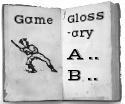Leik Mjul: Difference between revisions
No edit summary |
No edit summary |
||
| (One intermediate revision by the same user not shown) | |||
| Line 8: | Line 8: | ||
|Description=<p>Isak Lidström, a doctoral student at Malmö University, reports that in studying the isolated island of Runö in the Baltic Sea, he found a game called "leik mjul" ["play ball"] among the Swedes there prior to World War II.</p> | |Description=<p>Isak Lidström, a doctoral student at Malmö University, reports that in studying the isolated island of Runö in the Baltic Sea, he found a game called "leik mjul" ["play ball"] among the Swedes there prior to World War II.</p> | ||
<p>One source suggests that the game came to the island in the 1840's when a ship from England was stranded, and that perhaps the game evolved from rounders.</p> | <p>One source suggests that the game came to the island in the 1840's when a ship from England was stranded, and that perhaps the game evolved from rounders.</p> | ||
<p>Isak is preparing a paper on the find for publication, and Protoball plans to update this entry at a later time.</p> | <p>Isak is preparing a paper on the find for publication, and Protoball plans to update this entry at a later time. His March 2018 summary:</p> | ||
<p> </p> | <p> </p> | ||
<div> | |||
<p><span lang="EN-GB">"Leik mjul" is definitely related to Swedish brännboll, although the latter is a simplified game. “Leik mjul” is the same game as English rounders, as it was played in the 1840s. Swedish brännboll also derives from English rounders. It was introduced by physical educators in the late 19<sup>th</sup> century. It was first called “rundboll” (roundball) and included a pitching procedure and a base running around five bases. As it was played in the schools, more simplified rules were required. The pitching procedure is gone nowadays – instead the batsman throws up the ball himself. Even the pitch has changed. It is shaped like a rectangle, with four bases.</span></p> | |||
</div> | |||
<p><span>-- isak</span></p> | |||
<p> </p> | <p> </p> | ||
|Sources=<p>Emails from Isak Lidström and David Block, 2016- | <p> </p> | ||
|Sources=<p>Emails from Isak Lidström and David Block, 2016-18.</p> | |||
<p>Isak's paper is found at http://kgaa.nu/tidskrifter/bok/arv-2017. Once at this site, click on the "Ladda ned Arv 2017" link. The article is written in English. </p> | |||
|Source Image= | |||
|Comment= | |||
|Query= | |||
|Has Supplemental Text=No | |Has Supplemental Text=No | ||
}} | }} | ||
Latest revision as of 08:40, 18 January 2022
| Game | Leik Mjul |
|---|---|
| Game Family | Baseball |
| Location | Estonia |
| Regions | Europe |
| Eras | Predecessor |
| Invented | No |
| Tags | |
| Description | Isak Lidström, a doctoral student at Malmö University, reports that in studying the isolated island of Runö in the Baltic Sea, he found a game called "leik mjul" ["play ball"] among the Swedes there prior to World War II. One source suggests that the game came to the island in the 1840's when a ship from England was stranded, and that perhaps the game evolved from rounders. Isak is preparing a paper on the find for publication, and Protoball plans to update this entry at a later time. His March 2018 summary:
"Leik mjul" is definitely related to Swedish brännboll, although the latter is a simplified game. “Leik mjul” is the same game as English rounders, as it was played in the 1840s. Swedish brännboll also derives from English rounders. It was introduced by physical educators in the late 19th century. It was first called “rundboll” (roundball) and included a pitching procedure and a base running around five bases. As it was played in the schools, more simplified rules were required. The pitching procedure is gone nowadays – instead the batsman throws up the ball himself. Even the pitch has changed. It is shaped like a rectangle, with four bases. -- isak
|
| Sources | Emails from Isak Lidström and David Block, 2016-18. Isak's paper is found at http://kgaa.nu/tidskrifter/bok/arv-2017. Once at this site, click on the "Ladda ned Arv 2017" link. The article is written in English. |
| Source Image | [[Image:|left|thumb]] |
| Comment | Edit with form to add a comment |
| Query | Edit with form to add a query |
| Has Supplemental Text |
Comments
<comments voting="Plus" />
